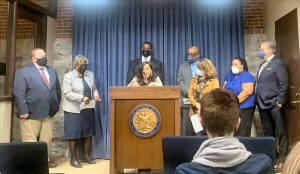Lawmakers unveil bills aimed at addressing teacher shortage
 Send a link to a friend
Send a link to a friend
[February 26, 2022]
by
GRACE KINNICUTT
Capitol News Illinois
gkinnicutt@capitolnewsillinois.com
 SPRINGFIELD – Illinois Senate Democrats
outlined legislation during a Thursday news conference that aims to
address the ongoing teacher shortage throughout the state. SPRINGFIELD – Illinois Senate Democrats
outlined legislation during a Thursday news conference that aims to
address the ongoing teacher shortage throughout the state.
The bills would extend the number of days retired and substitute
teachers would be able to teach in a school year, waive substitute
teaching licensing fees, and lower the minimum age for a person who can
become a paraprofessional.
While the package of legislation is a short-term fix, Senate Democrats
said, it is intended to help provide immediate relief to the teaching
shortage.
Courtney Goss, who works as a social and emotional support professional
at Washington Middle School in Springfield, said it’s difficult to do
her job because she often gets called to sub when teachers are absent
and not enough substitutes are available.
As a support specialist, Goss said she works with students and teachers
who have social and emotional concerns. But, she said, she is unable to
provide that needed support when she fills in as a substitute. Something
must be done, she said, because her students don’t receive the help they
need when she cannot provide it.
“I can’t just tell people how to take care of themselves, how to
prioritize things in their life, if I’m not doing the same,” Goss said.

Illinois State Board of Education data show there are 4,120 teaching and
support vacancies across 852 school districts, including 1,703 full-time
teaching vacancies, as of October.
Overall, 88 percent of the districts responding to a recent survey by
the Illinois Association of School Administrators said they had a
shortage of full-time teachers, while 96 percent said they had a
shortage of substitute teachers.
Senate Bill 3907 allows short-term substitute teachers to teach for 15
consecutive days instead of five. Sen. Doris Turner, D-Springfield, said
that it will provide schools an extra two weeks to find a long-term
solution to their staffing issues.
During floor debate, Turner said the bill is in response to staffing
shortages caused by the pandemic and it will be phased out in June 2023.
The bill passed the Senate unanimously this week and will await a vote
in the House.
Sen. Patrick Joyce, D-Essex, introduced Senate Bill 3893 that will
extend the number of days substitute teachers can teach from 90 to 120
days for the next two years. That bill passed the Senate as well and is
awaiting action in the House.
Sen. Napoleon Harris, D-Harvey, introduced SB 3201 that would allow
retired teachers to return to the classroom for 140 paid days through
the 2023 school year without affecting their retirement benefits.
Currently, retired teachers are only allowed up to 120 days in the
classroom. Only 100 of those days could come in a single classroom under
the new bill.
Harris said the best way to tackle the shortage is by retaining veteran
teachers and encouraging young leaders to join the profession. His bill
awaits Senate action.
[to top of second column]
|

Illinois Senate Democrats outlined legislation at a
Thursday news conference that addresses the ongoing teacher
shortage. Democrats said the bills would be a short-term fix and
provide immediate relief. (Capitol News Illinois photo by Grace
Kinnicutt)

“This is a massive burden on our educational system and allowing retired
teachers to return to school for a long period of time will help ease
that burden,” Harris said.
According to ISBE, there are 1,242 vacancies for paraprofessionals
statewide. Sen. Cristina Pacione-Zayas, D-Chicago, introduced Senate
Bill 3988 that lowers the age from 19 to 18 for individuals seeking to
receive a paraprofessional license. It passed the Senate unanimously and
awaits House action.
Sen. Robert Martwick, D-Chicago, said Senate Bill 3465 is similar to a
bill that was created for downstate teachers and allows Chicago Public
Schools the option of hiring retired teachers without affecting their
retirement annuity. It passed the Senate unanimously and awaits House
action.
Democrats also proposed to waive the application fee for short-term
substitute teaching licenses during a governor-declared public health
emergency.
The Senate Democrats called their news conference a few hours after
Senate Republicans unveiled a legislative package that they say promotes
transparency and provides parents a voice in their child’s education.
In Senate Bill 4179, Republicans aim to require school districts to post
school curriculum on the district website at least twice per year.
Sen. Neil Anderson, R-Andalusia, said he believes parents have a right
to know what materials are being taught in schools in order to better
understand what their child is learning.
“I have school-aged kids,” Anderson said. “I want to be able to adopt
the same teaching method that instructor is using to help that student.”
Sen. Terri Bryant, R-Murphysboro, introduced Senate Bill 4180 that
creates five new seats on the Illinois State Board of Education. One
board member per judicial district would be elected by voters.
Bryant said parents have a say in electing local school board officials,
but she feels they also deserve a say on the state board level, because
of the power the body has over education standards.

Republicans also proposed strengthening and improving the state’s
“Invest in Kids” program that provides scholarships to help low-income
students. Scholarships are funded by private donations, the donors of
which are eligible for tax credits.
Under Senate Bill 4181, Sen. Jil Tracy, R-Quincy, said the program would
become permanent and provide educational stability for students.
The Republican bills had not moved in the Senate as of Friday afternoon,
a legislative deadline for bills to move to final passage in the
chamber.
Capitol News Illinois is a nonprofit, nonpartisan news service covering
state government and distributed to more than 400 newspapers statewide.
It is funded primarily by the Illinois Press Foundation and the Robert
R. McCormick Foundation. |